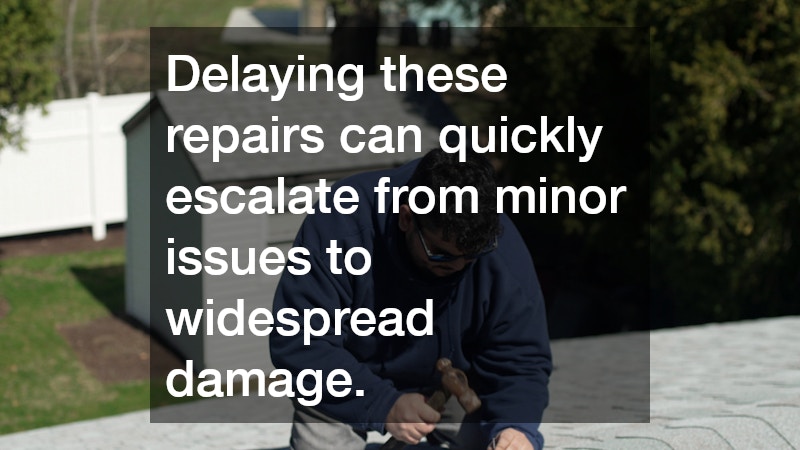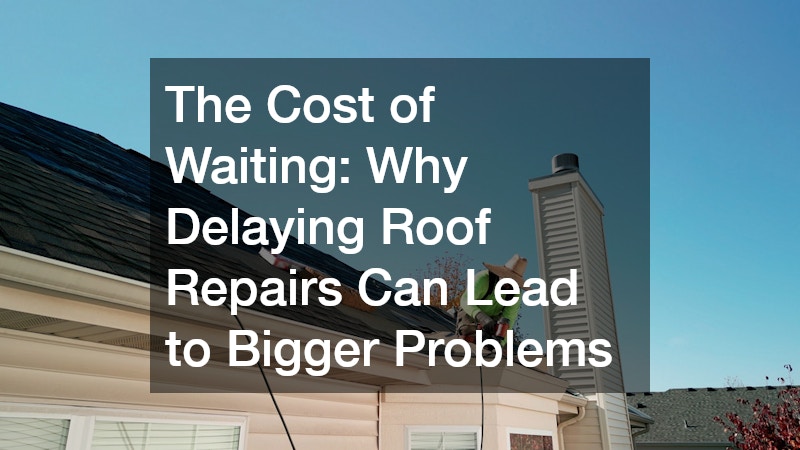The Cost of Waiting: Why Delaying Roof Repairs Can Lead to Bigger Problems
Homeowners often overlook roofing repair until a significant issue arises, not realizing the critical role a roof plays in protecting their home. Delaying these repairs can quickly escalate from minor issues to widespread damage, leading to substantial financial and structural consequences. Ensuring timely repairs is not just an investment in your roof, but also in the long-term preservation of your home.
How Can Delayed Roof Repairs Affect Your Home’s Structure?
Potential Water Damage
Water ingress can penetrate structural components of your home, posing a threat to both ceiling and wall integrity. Over time, this moisture can lead to rot, weakening essential support structures and potentially causing costly damage.
In addition to structural damage, water can seep into electrical systems, creating hazardous conditions and increasing the risk of short circuits or fires. Addressing roof repairs promptly can prevent these dangerous scenarios and protect your home.
The National Roofing Contractors Association estimates that ignored leaks can lead to ten times more damage than the cost of a simple repair. This statistic underscores the importance of taking immediate action at the first sign of trouble, ensuring that small leaks do not lead to extensive structural challenges.
Mold and Mildew Concerns
The presence of leaks fosters conditions conducive to mold and mildew growth, which can proliferate within 24 to 48 hours. This rapid spread can compromise not just the physical structure but also the air quality within your home.
Exposure to mold spores can trigger allergic reactions, respiratory issues, and other health problems for occupants, particularly those with pre-existing conditions. Effective roof maintenance serves as a crucial defense against these health risks.
For homes that are particularly susceptible to damp conditions, even a small leak can introduce thousands of mold spores into the air. Quick action in resolving roof leaks is vital in preserving a safe and healthy living environment.
What Are the Financial Implications of Postponing Roof Repairs?
Short-term Costs vs. Long-term Expenses
While handling a minor roof repair might seem costly in the short term, the expenses associated with ignoring it can spiral out of control. Postponing repairs typically results in more extensive damage, significantly increasing future repair costs.
For instance, addressing a simple shingle replacement today might prevent you from facing expenses related to significant structural repairs in the future. Early intervention is a practical financial strategy for homeowners.
According to industry data, delaying roof repairs can multiply costs by over 50% as damages worsen over time. To minimize financial exposure, it is prudent to invest in immediate upkeep.
Impact on Home Insurance
Homeowners delaying roof maintenance might notice a negative impact on their insurance premiums, as insurers may view neglected homes as higher risk. This risk perception can lead to increased rates and possible policy alterations.
Further, claims resulting from damage exacerbated by neglect may not always be covered by insurance, leaving homeowners to shoulder the financial burden. Ensuring timely repairs can preserve favorable insurance conditions and prevent claim denials.
Home insurance companies may also require proof of regular maintenance before processing claims. This further emphasizes the necessity of consistent roof upkeep to avoid lapses in coverage.
How Does Delay Impact Energy Efficiency and Utility Bills?
Loss of Insulation
Roof damage often results in compromised insulation, leading to inefficiencies in energy usage by allowing heat or cooling to escape. This inefficiency can significantly increase the energy required to maintain comfortable indoor temperatures.
Over time, the loss of proper insulation amplifies the strain on HVAC systems, resulting in increased wear and potentially shortening their lifespan. Prompt repairs ensure optimal insulation performance and contribute to the longevity of home systems.
Leading experts on energy efficiency report that unmanaged roof leaks can reduce insulation effectiveness by up to 50%. This statistic highlights the importance of proactive maintenance to safeguard your home’s energy performance.
Increased Heating and Cooling Costs
Compromised roofing allows for more significant heat transfer, leading to higher heating and cooling needs and, consequently, elevated utility bills. Homeowners might witness as much as a 30% increase in costs when a roof is not performing effectively.
A well-maintained roof is key to ensuring energy efficiency, directly impacting the affordability of homeownership. Timely repairs preserve the integrity of your home’s thermal envelope, keeping energy expenditures manageable.
The Environmental Protection Agency highlights that energy-efficient homes rely on intact, quality roofs for maintaining efficiency. Prioritizing roof repairs is a direct investment in reducing future utility expenses.
Conclusion
Delaying roof repairs is a risk that can affect your home’s structure, finances, and energy efficiency. From severe structural damage to escalating financial costs and increased energy expenditure, ignoring needed repairs can have far-reaching consequences. By addressing roof repairs promptly, homeowners can safeguard their investments, ensure safety, and maintain the overall integrity of their homes.

